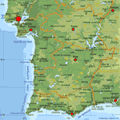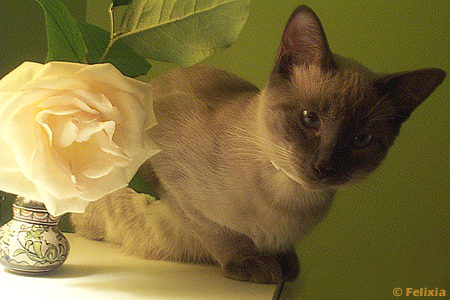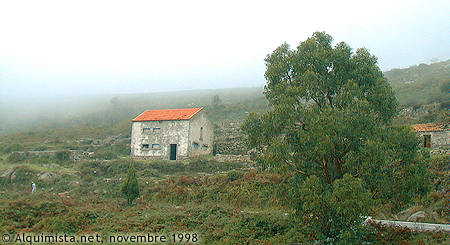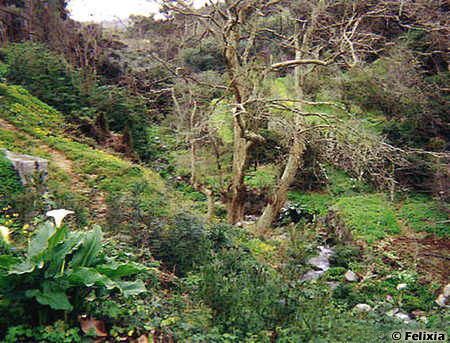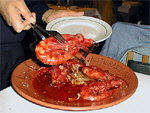(Lire
la même page en français, traduction par
l'auteur)
Day
3, I'm getting my bearings - I'm getting used to the
sudden daybreak at seven-thirty sharp. One minute, total
darkness, and the other, total daylight. It's neither
sunny nor grey, but it's not raining.
I
load the new car the rental agency gave me yesterday
(this one doesn't protest at stops), and leave the hotel
at ten. My search for an Internet café doesn't
yield much success and getting around a Portuguese town
is not made easy by the total absence of street signs.
Inquiries only trigger pragmatic Em frente responses.
I soon figure it out ... if you follow Em frente
(straight ahead) long enough, you'll pass this way again
in two or three years because the world is round. So
it will be me and my nose, a true Portuguese explorer.
I
reach the Monchique foothills some twenty minutes
after leaving Albufeira. Mid-February, and spring is
in full bloom. Flowering almond trees dot the landscape,
trees are green and contrast well with the silvery light.
I stop to fill the car's tank. I won't be driving on
the highway and it should take five or six hours to
get to Setúbal. Antenna Dois on the radio,
I settle in for a long leisurely drive.
Suddenly,
on the right, I see an enormous tree, all yellow-flowered
and beckoning. Mimosa. I slow down and stop the car
on a convenient wide embankment. The tree holds magic
for others too. A couple is busy cutting masses of branches.
The man holds a branch down for me to cut. I exercise
restraint, like I did yesterday when buying the minuscule
ceramic flower pot. The tiny branchlet of flowers fills
the car with heady perfume. Soul satisfied, I continue
on towards the Serra.
My
steady pace is broken by local traffic. A man on a small
cart preceded by a ... donkey. I accommodate and follow,
very slowly. A long line of cars soon joins the parade.
Some are less patient than others, but the road has
started to curve this way and that, and the oncoming
traffic doesn't allow for escape.
Having
marked his three-mile-long statement, the cart-driver
finally pulls off to the side and Twenty-first century
pace resumes.
Serra
de Monchique is blessed with a microclimate, lush
foliage and high mountains veiled in mist dipping into
deep ravines where rivers cascade. It offers a marked
contrast with the arid Algarve coast. The road through
the Serra winds up, en corniche, with
barely enough space for two-way traffic. The atmosphere
is all vaporous, luxuriant vegetation, otherwordly with
stately conventual architecture, secular farmhouses,
and grazing sheep. The whole setting is so different
from my natural habitat that I'm totally captivated,
eyes avidly seeking out the minutest detail for comparison
and storage in my long-term memory, to be retrieved
in minus forty weather.
Before
leaving Québec that February ... The weather is rarely
- 40 C when all is muffled up in the snow. It's before,
or after, that the winds turn bitterly cold.
One
detail grabs me by the shoulders, shakes me out of my
bliss and into astonishment. In the ditch, a clump of
calla lilies. Beauty!
I
nearly hit the brakes but the cars behind hold me back,
so I continue on, mind racing.
Calla
lilies in the ditch? Are they wild? Were they part of
a planned landscape and did I miss the house that went
along with it? An anomaly? I drive on, soon to see another
occurrence. This time, a house, nearby ... Ah! They're
not wild. Stifling my disappointment, I drive on again,
cupidity starting to rise in my soul.
Only
one, do I think, one, to go along with the mimosa.
The
calla lilies taunt me. They hide, sometimes in apparent
domesticity, sometimes in wild abandon, along the curves
of the narrow road. No embankment by the road , oncoming
and following traffic contributing to sharpen my caution.
I can't stop the car, frustration building. The teasing
reaches unbearable pitch when, finally, I see a large
mass of calla lilies on one side of the road and, on
the other, perched on the flanks of the ravine, a tea
house. Quick on the blinker, I park the car in the pocket-sized
parking.
Imperfect
Portuguese: Pode dar-me chá se faz favor?
The old woman with the keen eyes and the weathered face
wipes her hands on her apron then indicates a table
for me to sit at.
I
would sit outside, under the pergola, but the
weather has turned to cool, humid mountain frigidity.
The tea arrives, welcoming warmth nourishing my courage
... Estas flores?, pointing to the calla lilies
across the road. Unintelligible response from the woman.
I pause, then, spurred on by my desire, I continue:
É possivel dar-me uma flor?
My
accent must be terrible, the woman looks at me in total
incomprehension.
|
Serra de Monchique vue près de Marmelete
|
Another
sip of tea, repli stratégique.
The
impasse is broken by the arrival of a lively crowd of
... two women. Blond, voluble, familiar, they engage
in fluent conversation with the old woman. One woman
separates from the others and comes to me.
"Hello,
do you speak English?"
"Yes", I reply.
"I am German and spend my winters here, in Monchique.
Will you be staying around here?"
"No, I'm meeting a friend later on today in Setúbal."
"What did you ask the owner ? She doesn't understand."
I
chuckle: "It must be my accent. I was asking if
I could have one of the calla lilies on the other side
of the road. Are they wild ?"
"Yes, they grow everywhere, like weeds."
She
turns to the older woman and speaks some words in Portuguese.
The woman disappears and returns with ... a shovel !
In
horror, I exclaim: "No, not the whole plant, just
one flower, please!"
The
woman abandons the shovel, crosses the road, knife in
hand, and flitters here and there in the well-tended
and cultivated patch. She soon returns with a bunch
of twenty or so immense calla lilies. The image of the
two-inch flower pot flashes through my mind, stirring
peals of silent laughter.
I
thank her and my German interpreter profusely, dish
out the Vitamina Zero cellphone plastic casing and fill
it with water from a water bottle. While I arrange the
lilies in the container, I notice that they are inhabited
by a snail. He will be a perfect companion, do I think,
I'll adapt my pace to his.
Calla
lilies last forever. Every evening, I would arrive at
an hotel, waltz in with my container full of flowers
and leave the next morning, packing them into the car.
Now,
whenever I see a calla lily, I think of those two women
in the Serra de Monchique and their generosity
of soul and spirit. In the language of flowers, the
calla lily means: Magnificent beauty or panache.
And, for sure, it is surely thus.
(1) Photo communiquée
par © Fernando
Correia.





